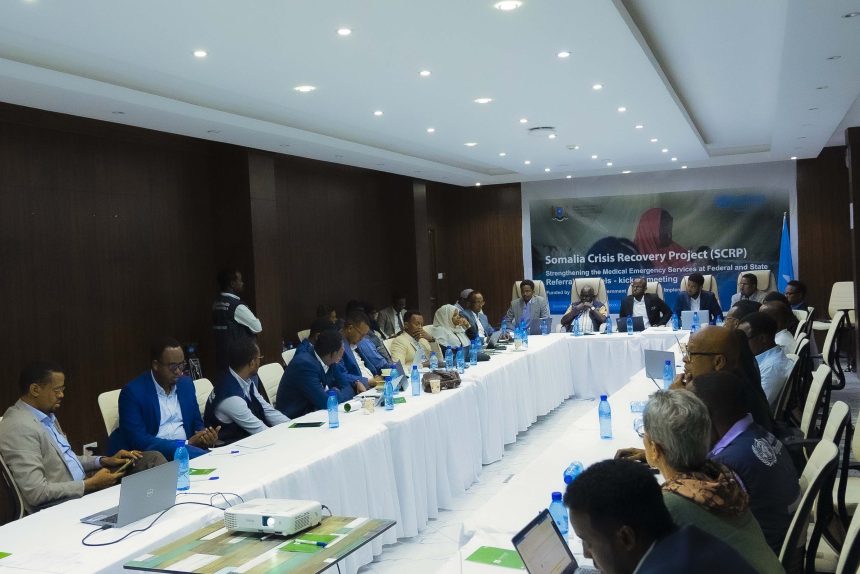The Federal Government of Somalia through its Ministry of Health and Human Services launched a new project aimed at strengthening the medical emergency services at federal and state referral hospitals, particularly critical care capacities.
With a budget of US$11.4 million, funded by the World Bank under the Somalia Crisis Recovery Project (SCRP), this collaborative initiative comes as the country’s health system grapples with high levels of communicable and non-communicable diseases, including injuries, and disabilities caused by ongoing conflict and widespread use of improvised explosive devices.
The project called ‘Strengthening the Medical Emergency Services at Federal and State Referral Hospitals’ will be delivered through the United Nations’s World Health Organization (WHO).
“We have started important work to strengthen Somalia’s emergency healthcare through the Somalia Crisis Recovery Project. By upgrading facilities, training staff and coordinating health services, we are building sustainable capacity to respond to health crises and serve citizens across the country. This targeted support will have a significant impact on Somalia’s healthcare system both now and in the future.” Abdi Tawane, Co-Project Manager of the Somalia Crisis Recovery Project, stated.
The focus of this project is the establishment and operationalization of emergency, critical and operative care services in eight selected hospitals across the country. These will enable the hospitals to properly function as regional referral hospitals, delivering emergency and critical care services as part of the Government’s vision for delivering integrated health services defined by the Essential Package for Health Services (EPHS 2020) of Somalia.
“Close collaboration among all partners and open reporting to our Project Implementation Unit will be vital to demonstrate governance and maximize outcomes for Somali citizens. With transparency and shared commitment, I’m hopeful this project will save many lives while also sustaining public trust in our institutions.” Said Saleiman Sheik Umar, Director General of the Ministry of Finance.
This project also seeks to strengthen the referral mechanisms between primary health care and other higher levels of healthcare in the country for critical care support thereby establishing a model integrated health care delivery system that are essential to meet every people’s health needs across the life course.
“This crucial component of the Somalia Crisis Recovery Project builds on the strong partnership between the Ministry of Health, Ministry of Finance, the World Bank, and WHO in Somalia,” said H.E. Dr Ali Hadji Adan Abubakar, Minister of Health and Human Services, Federal Government of Somalia. “Somalia made great strides during the COVID-19 pandemic to strengthen national capacity to prepare, respond, and recover from public health crises, with the support of partners like WHO and the World Bank. More action is needed to meet the immediate needs of the population and strengthen surveillance and laboratory systems to detect and respond to emerging public health threats.”
Through its various components, the Somalia Crisis Recovery Project (SCRP) is a holistic programme supporting recovery from past disasters while enhancing resilience to future shocks. The SCRP recognizes the importance of bolstering the country’s health system as it responds to climate and conflict-related crises. Through Component 3, the Project Implementation Unit (PIU) is working closely with the Ministry of Health to pilot approaches for building resilience in the health sector. This includes establishing emergency telehealth networks to ensure remote populations can access care during disasters, upgrading disease early warning systems to predict outbreaks, and training community health workers in first aid and trauma response. By helping Somalia’s health system withstand future climate shocks through innovative capacity building like this, the project aims to lay the groundwork for more resilient healthcare nationwide and support the basic right to health for all Somalis in this challenging context.
Dr. Mamunur Rahman Malik, WHO Representative and Head of Mission to Somalia, recognized the commitment of the Federal and State Ministries of Health, saying, “Using a health system approach, this project will underscore the need for greater investment in emergency and critical care services in Somalia as has been highlighted in the recent resolution of WHA76.2 for improving integrated emergency, critical and operative care services as continuum of care which is an important ingredient for achieving universal health coverage. Improving these services will also enable the country to be better prepared and ready to manage critical care patients for any future pandemics and also promote the enjoyment of health as human rights.”
The kick-off meeting comprised an official launch followed by a deep dive discussion about the project implementation between WHO, the project implementation unit at the Ministry of Finance, the Federal Ministry of Health, and Federal Member States. Participants reviewed the project implementation plan and agreed to collaborate closely to ensure the achievement of project development goals and objectives as per the timeline agreed upon by the government and partners in strengthening of critical care units across Somalia.





